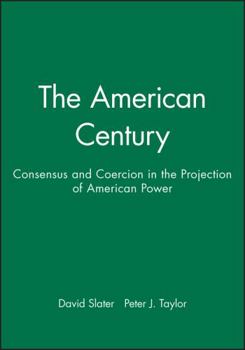American Century
Select Format
Select Condition 
Book Overview
This book brings together studies of Americanization and American imperialism to assess how far the twentieth century can be seen as the "American Century".
Format:Paperback
Language:English
ISBN:0631212221
ISBN13:9780631212225
Release Date:November 1999
Publisher:Wiley-Blackwell
Length:378 Pages
Weight:1.60 lbs.
Dimensions:1.0" x 6.8" x 9.6"
Customer Reviews
1 rating
An excellent account of a mostly neoliberal perspective
Published by Thriftbooks.com User , 22 years ago
"The American Century," a collection of essays edited by Peter Taylor and David Slater, is a formidable and challenging work. Not so much for its intellectual complexity, (although it has that) but for the formidable answers the scholars herein set forth to the cries of all-powerful American hegemony that have been heard in the academy of late. While by no means locating America within the myth of the benevolent, neutral harbinger of prosperity and progress, the authors in the text have a nuanced account of issues in the projection and effectiveness of United States power in the larger global context that remains largely in the neoliberal tradition.Essays in the book reflect a variety of perspectives, but all of them involve around some similar themes--- the rise of U.S. hegemony as a world-system in a historical context, beginning in the last 19th century and culminating during the Cold War period. The essays within also focus on institutions created or maintained with the imprimatur, if not the actual effort, of the United States, such as the World Bank, International Monetary Fund (IMF), and to a lesser extent, the United Nations. An advantage to the discussion of American hegemony is the focus the text gives to economic analysis; a topic often overgeneralized in political discussions of American influence. Michael Taylor chronicles the shift from horizontal and vertical stratification to outsourcing R+D, and characterizes this as a shift to the dividing the managerial aspects of material production and strategizing functions related to global market dynamics. Also well-treated are issues of idealism, isolationism, and Cold War containment, as well as military policy, brilliantly expounded on by David Campbell. Perhaps debatable is the minimization of the many of the scholars of "American imperialism" outside the late 1800's.Less successfully covered in the study are the results and effects of American influence/hegemony. Essentially, this volume is about the projection of American power. There isn't anything wrong with that, but for a volume written more by those whose work in American Studies is from an internationalist perspective (and international location (as none of the contributors works in the United States) it would have been more helpful to see more scholarship on reception and transformation of American culture within national and sub-national cultures in other countries. This makes the few essays that cover topics in this realm, such as those by Tim Cresswell, Brian Hoskin, and Claudia de Lima Costa, especially important. Hopefully, future editions will cover more topics in this area. As a politically neoliberal leaning reader, it is perhaps read best in conjunction and dialogue with a more radical reader, such as "Cultures of United States Imperialism" edited by Amy Kaplan and Donald Pease, published in 1993 on Duke University Press.






